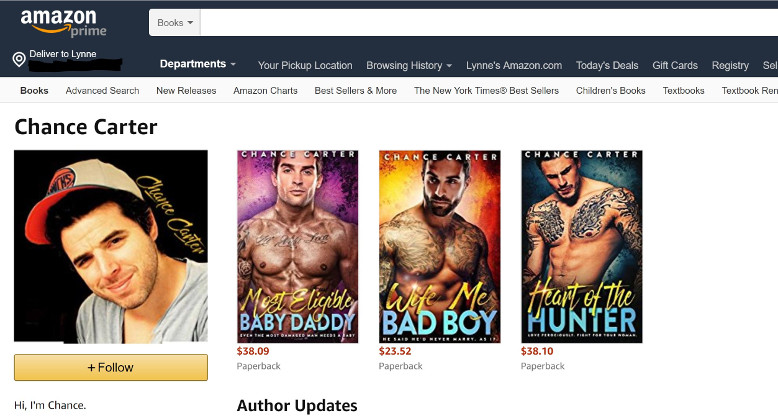
Poor Chance Carter. Poor, poor Chance Carter. Here he is, just a guy trying to make a living at this indie author thing, and he gets caught in Amazon’s bookstuffing dragnet.
Bookstuffing works like this (don’t try this at home!): In an effort to get the largest possible payout on Kindle Unlimited borrows, certain authors have been shoveling several books into a single book file and marketing it as a single book. Sometimes they reuse the same bonus books multiple times; David Gaughran recently shared a chart that shows how an author named Cassandra Dee does it (again, please don’t try this at home!). These authors will put a come-on at the front of the file to entice readers to click to the last page of the book in order to enter a contest or get a free short story; the bots at KU then count the whole book as read.
The bigger the file, the bigger the number of pages, right? So the more pages read, the bigger the payout per book. Bookstuffing is, in fact, extremely lucrative: Cassandra Dee is Amazon’s #1 Contemporary Romance author. Until his downfall, Chance Carter was also a highly-ranked Contemporary Romance “author” (he reportedly used ghostwriters) on Amazon. Each of these authors routinely takes home one of the monthly KDP Select All-Star bonuses – leaving a smaller pie for the authors who play by the rules.
The thing is, all of this has been against KDP’s Terms of Service forever. So why hasn’t Amazon cracked down on the practice before now? I don’t want to cast aspersions, but top-earning bookstuffers often plow a chunk of their earnings back into Amazon by buying AMS ads for their books.
Amazon did make a change this month to its Terms and Conditions for bonus content. You can find the whole rule here, but briefly, it appears indies can avoid Chance Carter’s fate by making sure they follow a few simple rules:
1. Putting bonus content (like a sample chapter or a short story) in the back of your book is fine, but make sure it’s no more than 10% of the size of your book.
2. It’s okay to include a link for readers to sign up for your newsletter, and it’s okay to offer them bonus content (like a short story, not like a free Kindle!) for doing so. Just don’t put a link in the front of the book to the newsletter sign-up link in the back of the book.
3. List your bonus content in your table of contents.
4. If you decide to publish several books in a single volume, clearly label it as a collection or an omnibus edition or “the complete series” or something like that.
So what happened to Chance? He’s been booted. I just looked up his author page on Amazon US. By all reports, he once had 30 or so titles for sale; he’s now down to three, all of them paperbacks offered by third-party sellers. His Audible books are gone, too. It’s unclear whether KDP kicked him out because of bookstuffing or because of some other Terms and Conditions violation. And it might be that Amazon decided to make an example of him; so far, it’s still business as usual for other known bookstuffers, although some of them have added the word “compilation” to some of their titles.
It’s unclear whether KDP kicked him out because of bookstuffing or because of some other Terms and Conditions violation. And it might be that Amazon decided to make an example of him; so far, it’s still business as usual for other known bookstuffers, although some of them have added the word “compilation” to some of their titles.
Personally, I intend to keep playing by the rules, and I hope you guys will, too. I’d hate to see any IU fans in a situation like Chance’s.

Good to know. Thank you.
You bet, Yvonne!
I’m inordinately proud of that photo at the top, btw. I thought it up myself and everything. 😀
I’ve been following some of this on Twitter, via David Gaughran, but that list of simple rules is perfect. I was much relieved to be able to tick each one off for my books. Sadly, I don’t really believe the changes made by Amazon will really save KU, not long term. The system has too many holes in it, the AI isn’t smart enough, :/and the snake oil salesmen will always find ways to game the system. :/
You’re right about that last one, for sure, Meeks. As soon as Amazon fixes one problem, the people gaming the system are figuring out a new way around it.
Gosh! And here I am, trying desperately to figure out how to sell snake oil! I hear it goes much slicker than books.
LOL, Gordon!
Thanks. It’s impossible to keep up with all the scams! I agree with acflory: KU is a nice idea, but it’s just too messy and too easy to game. If Amazon is making money from it, though, it’s here to stay.
I don’t see it going away any time soon, Virginia.
Very informative, Lynne; thank you! Loved the photo as well:>)
It always amazes me that people who are capable of doing very well legitimately, choose to cheat the system instead. With this author in question all I can say is “karma.”
That karma bus comes around the corner when you least expect it. 😉 Thanks, Karen!
One reason Carter got nailed is, apparently he not only was pushing the limits of what even Amazon tolerated with stuffing, but he also set up what appeared to be an illegal lottery (as defined in most US states and many other countries).
He was asking people to buy his books and those who did were entered into raffles to win prizes. That’s a no-no in most jurisdictions, a prosecutable criminal offense. Even if Amazon was slow to take action against the stuffing, they likely couldn’t take the chance of states or even the federal government holding Amazon responsible for hosting an illegal lottery–because if he’d gotten away with it, others would have followed, of course.
Of course. I don’t think the raffles were a new thing with him, though. It took some time for Amazon to get around to whacking him for them.